Kneeling at the crossroads of divinity and conflict, the Bible's narrative on Israel's wars offers a profound exploration of morality and destiny.

Does the Bible Talk About War in Israel
Just as you're considering the turbulent history of conflict in the modern world, you might find it intriguing how the Bible discusses war in Israel. From historical battles to divine commands and prophetic visions, the scriptures provide a complex tapestry of conflict and peace.
You're likely aware of some famous battles, but the moral and spiritual questions they raise are worth a closer look. As you ponder the role of Israel's leaders and the prophecies of peace, consider how these ancient texts reflect on today's world.
This conversation might just change your perspective on the timeless nature of human conflict.
Key Takeaways
- The Bible details numerous wars in Israel, corroborated by archaeological evidence and cultural influences.
- Divine commands were central to Israelite battle strategies, intertwining faith with military action.
- Ethical considerations of war in the Bible raise questions about morality, justice, and divine intention.
- Prophetic visions in the Bible predict both conflict and peace, influencing contemporary discussions on peace and reconciliation.
Historical Context of Biblical Wars
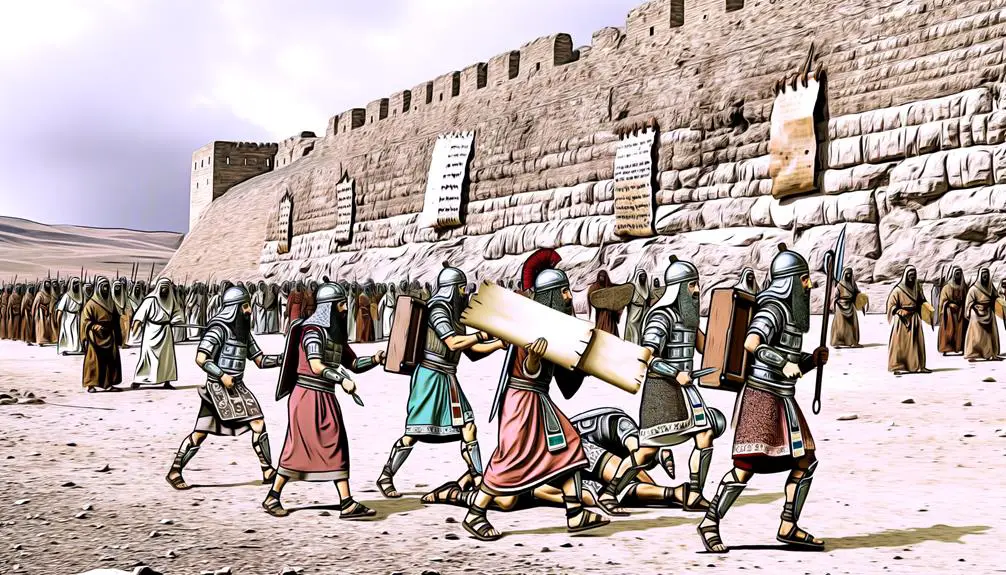
Throughout history, numerous wars have shaped the landscape of Israel, as depicted in the biblical narratives. These conflicts, chronicled with varying degrees of detail, provide a window into the tumultuous past that has defined the region. You're entering a realm where archaeological evidence and textual analysis converge, offering insights into the ancient wars that have left an indelible mark on the cultural and political fabric of the Middle East.
Archaeological evidence plays a pivotal role in corroborating the accounts of warfare described in biblical texts. Excavations across Israel have unearthed artifacts and fortifications that echo the tales of conquest and defeat narrated in the scriptures. These findings not only validate historical accounts but also shed light on the strategies, weapons, and fortifications used in ancient warfare. You're looking at a tangible connection to the past, where pottery shards, ancient walls, and weapon remnants speak volumes about the conflicts that once ravaged this land.
Cultural influences stemming from these wars are profound and far-reaching. The amalgamation of diverse cultures through conquest and assimilation has left a rich tapestry of religious, linguistic, and architectural legacies that continue to influence Israeli society today. You're witnessing the layers of history, where each conflict brought with it a wave of cultural exchange, from the Babylonian captivity to the Roman occupation, shaping the identity of the region.
Divine Commands for Battle
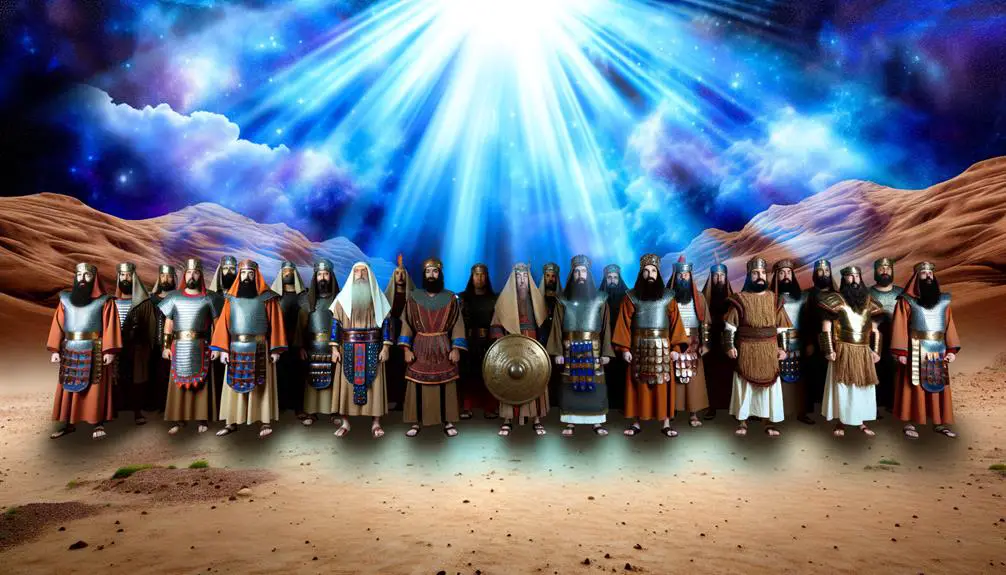
You'll find that the Bible not only recounts instances of conflict in Israel but also presents specific divine commands for battle. These directives encompass battle strategies and raise questions about the ethical considerations of war.
Analyzing these elements helps to understand the complex interplay between divine instruction and human action in biblical narratives.
Battle Strategies in Scripture
Several instances in the Bible depict God issuing specific commands for battle, offering insights into divine military strategies employed by the Israelites. These narratives not only highlight the reliance on divine guidance but also shed light on the warrior ethics and siege tactics of the time. The strategies vary, from direct confrontations to more complex siege operations, always intertwining faith with military action.
Aspect |
Description |
Biblical Reference |
|---|---|---|
Direct Command |
God directly instructs leaders on specific actions |
Joshua 6:2-5 |
Warrior Ethics |
Principles guiding conduct in battle |
Deuteronomy 20:1-4 |
Siege Tactics |
Strategies for surrounding and capturing cities |
Joshua 6:3-5 |
Faith in Battle |
Reliance on divine intervention |
2 Chronicles 20:15 |
Outcome |
Victory attributed to following divine commands |
Joshua 10:8 |
This framework underlines the importance of divine command and faith in achieving victory, reflecting a blend of spiritual belief and military strategy.
Ethical Considerations of War
In exploring the ethical dimensions of war, it's imperative to examine the divine commands issued for battle in biblical texts, which serve as a foundation for understanding the moral implications intertwined with warfare. These scriptures offer a unique perspective on war ethics and conflict morality, emphasizing the conditions under which war is deemed justifiable or necessary.
It's crucial to discern the contextual factors and divine intentions behind these commands, as they provide critical insights into the moral framework that governed ancient warfare. By analyzing these divine directives, you gain a deeper understanding of how ethical considerations were integrated into the decision-making processes of war, highlighting the complex interplay between divine will and human action in the context of conflict.
Prophetic Visions of Conflict

Throughout the biblical narrative, prophetic visions frequently depict conflict within and around Israel, offering insights into both historical and eschatological battles. These visions, rich with symbolism and allegory, are critical in understanding the biblical perspective on conflict. They not only recount past skirmishes but also project future turmoil, particularly end time predictions and apocalyptic battles. These prophecies serve as a lens through which one can discern the unfolding of divine will and the eventual triumph of good over evil.
In analyzing these prophetic visions, it's essential to differentiate between the immediate historical context and the broader eschatological implications. Prophets like Isaiah, Ezekiel, and Daniel, among others, spoke of conflicts that, while rooted in their contemporary geopolitical landscapes, also pointed towards future, more universal confrontations. These apocalyptic battles are characterized by their cosmic scale and moral significance, often symbolizing the ultimate battle between divine forces and evil.
The Book of Revelation, for instance, is replete with imagery of war, depicting the final confrontation between God's kingdom and the forces of Satan. This narrative encapsulates the climax of biblical prophecy concerning conflict, emphasizing not just the physical but the spiritual dimensions of warfare.
Such prophetic visions aren't merely historical records or speculative future events. They offer a theological framework within which the nature of conflict is understood as part of the divine plan. Through these visions, believers are called to perceive history and future with an eye towards the eventual fulfillment of God's promise of peace and justice.
Key Battles in Biblical Times
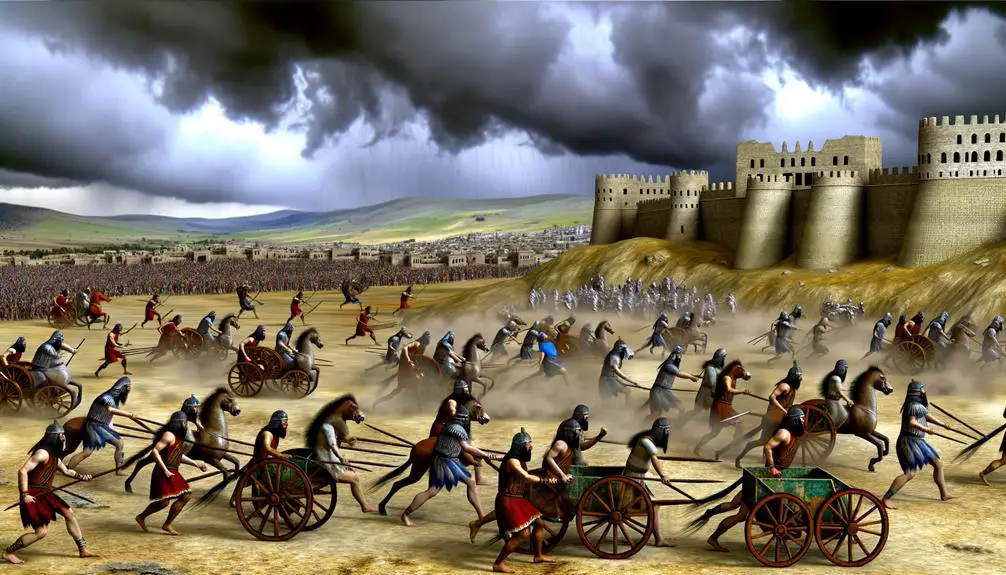
Frequently, the Bible recounts key battles that played pivotal roles in shaping the history and spiritual trajectory of Israel. These narratives not only serve as historical records but also offer insights into the martial strategies, weapon technology, and enemy alliances of the time. You'll notice a remarkable evolution in weapon technology as these accounts unfold, reflecting the arms race that was as much a part of ancient warfare as it's today. From the simple sling used by David to defeat Goliath to the fortified chariots of the Egyptians, the Bible provides a window into the technological advancements that often determined the outcomes of these conflicts.
Enemy alliances, too, play a crucial role in these biblical battles. The strategic partnerships between neighboring nations against common foes are a recurring theme. These alliances weren't merely military but often carried significant political and economic implications, influencing the course of history beyond the battlefield. The Bible meticulously documents how these coalitions either fortified Israel's defenses or posed grave threats, showcasing the intricate diplomacy of ancient times.
Analyzing these battles sheds light on the complexities of warfare in biblical times. It's not just about the clash of swords but also about the strategic minds behind them, the alliances that shaped them, and the technological innovations that were employed. These elements combined to forge the historical and spiritual narrative of Israel, offering a rich tapestry of resilience, faith, and transformation that continues to resonate today.
Moral Questions Surrounding Warfare
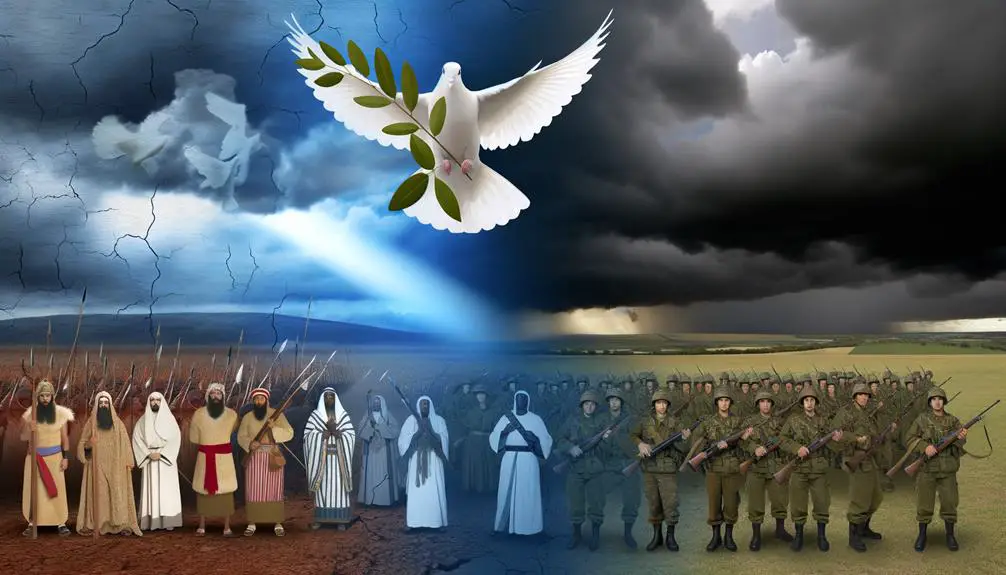
While the strategic and technological aspects of ancient warfare as depicted in the Bible offer insight into the physical battles fought, they also raise profound moral questions regarding the ethics and justifications of these conflicts. You're faced with narratives that not only recount historical events but also delve into the complex moral landscape of warfare. This consideration brings forth the Just War Theory and the Pacifism Debate, two pivotal frameworks through which these biblical wars are often analyzed.
- Just War Theory: This framework evaluates the morality of war, arguing that wars must meet certain criteria to be considered just. It questions whether biblical wars adhere to principles like a just cause, legitimate authority, and last resort.
- Pacifism Debate: This discourse challenges the very notion of war, advocating for nonviolent resolutions. It scrutinizes whether the teachings and examples set in the Bible support a pacifist approach to conflict resolution.
- Ethical Conduct in War: The discussion extends to the conduct of war, examining if biblical accounts endorse ethical behavior towards combatants and non-combatants.
- Divine Command Theory: This perspective considers whether wars in the Bible were justified based on divine commands, raising questions about divine morality and human interpretation.
- Historical Contextualization: Analyzing the moral implications of these wars requires understanding their historical and cultural contexts, which often differ significantly from modern perspectives on warfare.
The Role of Israel's Leaders
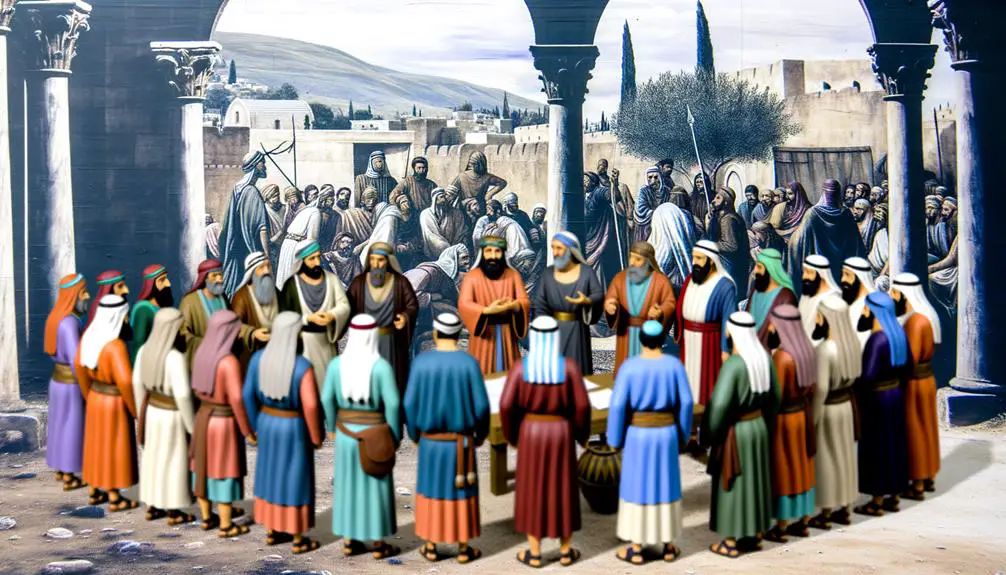
You'll find that Israel's leaders played pivotal roles in biblical battles, often shaped by divine directives and prophetic guidance.
These figures, from kings to prophets, were instrumental in navigating the moral and strategic complexities of warfare.
Their decisions and actions, as recorded in the Bible, offer insights into the intersection of faith, leadership, and conflict.
Leadership in Biblical Battles
Israel's leaders played pivotal roles in directing the outcomes of biblical battles, embodying both military strategy and divine guidance. Their leadership was marked by strategic use of military attire to command respect and signal readiness for battle. Skilled negotiation with enemies, seeking peace or advantageous terms when possible. Astute selection and deployment of troops, maximizing their strengths in varied combat scenarios. Reliance on divine instructions, often seeking prophetic guidance before engaging in conflict. Commitment to moral and ethical conduct in warfare, setting standards for treatment of captives and civilians.
These aspects underscore the multifaceted role of Israel's leaders, blending pragmatism with faith. Through their actions, they navigated the complexities of ancient warfare, leaving a lasting impact on the biblical narrative of conflict and survival.
Prophets Guiding Kings
Building on the foundation of strategic leadership, the role of prophets in guiding kings emerges as a critical element in Israel's biblical history, shaping decisions and influencing outcomes in times of war. This dynamic between prophet relationships and kingly duties underscores a unique partnership. Prophets often provided divine insight, impacting military strategies and governance, thereby reflecting an intertwined relationship crucial for national success.
King |
Prophet |
Impact |
|---|---|---|
Saul |
Samuel |
Guidance on kingship and divine displeasure |
David |
Nathan |
Reproof and prophecy fulfillment |
Ahab |
Elijah |
Warnings and confrontation |
Josiah |
Huldah |
Confirmation of disaster due to disobedience |
Zedekiah |
Jeremiah |
Warnings against impending conquest |
Analyzing these relationships highlights the integral role prophets played, not just in spiritual matters but in guiding the nation through turbulent times.
Peace Prophecies and Israel
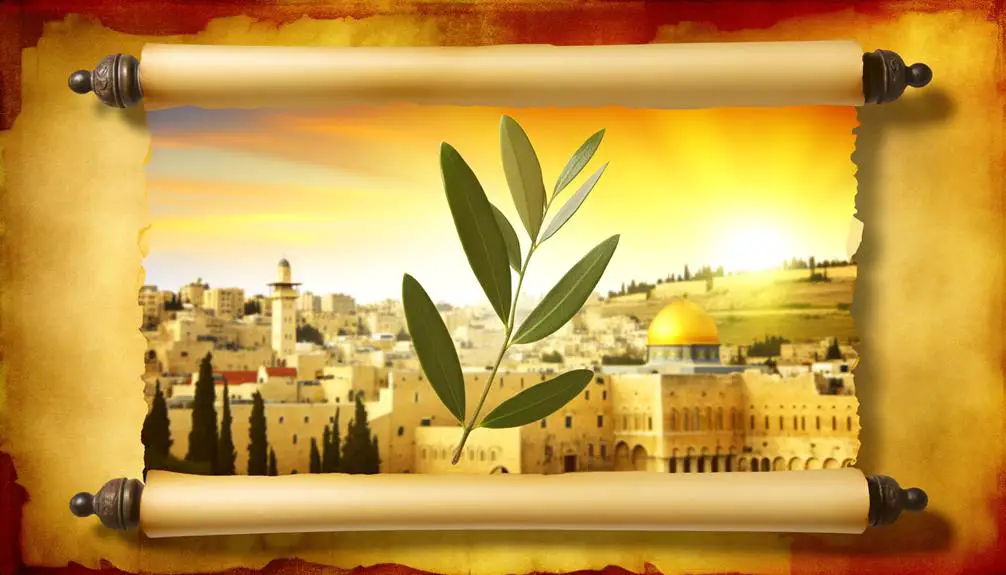
Throughout history, prophecies about peace have painted a complex tapestry of hope and conflict in the context of Israel. You'll find that these prophecies aren't just ancient texts; they're dynamic blueprints that continue to influence contemporary discussions about peace, spiritual reconciliation, and interfaith dialogues. Scholars and theologians alike delve into these texts, seeking insights that might guide today's efforts towards lasting peace in the region.
To make this exploration more engaging, consider these key aspects of peace prophecies related to Israel:
- The Role of Messianic Expectations: Many prophecies hint at a future era of peace ushered in by a Messiah. This concept is pivotal in understanding the various interpretations across different faiths.
- Spiritual Reconciliation: Prophecies often emphasize a coming together of peoples and a healing of nations, suggesting that peace isn't merely political but deeply spiritual.
- Interfaith Dialogues: Some prophecies have been interpreted as calls for dialogue between different religious communities, highlighting the importance of understanding and respect.
- Visions of Universal Peace: Beyond the boundaries of Israel, several prophecies envision a world united in peace, suggesting a global impact.
- Historical and Future Fulfillments: Scholars analyze past fulfillments of prophetic peace as a basis for understanding potential future realizations.
Analyzing these aspects reveals the depth and complexity of biblical prophecies regarding peace and Israel. They offer a framework not only for understanding historical events but also for approaching current conflicts and future hopes with a nuanced perspective.
Modern Reflections on Ancient Texts

Reflecting on ancient texts, scholars now engage with how these prophetic visions of peace inform contemporary discussions and influence modern policy decisions regarding Israel. As you delve into their analyses, you'll find that archaeological evidence plays a crucial role in understanding the historical context of these narratives. This evidence not only sheds light on the ancient conflicts and alliances but also provides a tangible connection to the past, allowing for a more nuanced interpretation of biblical texts.
Moreover, the concept of cultural adaptation is pivotal when considering the relevance of these ancient texts to modern times. Scholars argue that the messages of peace and conflict resolution found in the Bible must be understood within the evolving cultural and political landscape of the Middle East. They emphasize the importance of interpreting these texts through a lens that accounts for contemporary values and challenges, suggesting that ancient wisdom can indeed offer guidance in navigating the complex dynamics of modern Israeli society.
This scholarly endeavor seeks to bridge the gap between the past and present, urging policymakers and leaders to consider the ethical and moral lessons embedded in religious texts. By examining how prophetic visions of peace can be applied today, scholars contribute to a broader dialogue about conflict resolution and coexistence in the region. Their work underscores the enduring significance of these ancient texts, advocating for a thoughtful engagement with history that respects both tradition and the imperatives of modernity.
Frequently Asked Questions
How Do Modern-Day Military Tactics in Israel Compare to the Strategies Described in the Bible?
Modern-day military tactics in Israel incorporate advanced technology and intelligence, like cyber warfare, differing significantly from biblical strategies.
While the Bible depicts direct confrontations and divine interventions, today's approach emphasizes precision strikes and cybersecurity.
Additionally, peace negotiations now play a crucial role in conflict resolution, a contrast to the more absolute outcomes often described in scriptural battles.
This evolution reflects broader changes in warfare and diplomacy over millennia.
Can Specific Archaeological Findings in Israel Be Directly Linked to the Wars Mentioned in the Bible?
Ironically, you're digging up the past to solve a mystery. Through pottery analysis, you can trace the outlines of ancient battles. Inscription authenticity further cements these links, offering a direct connection to the wars chronicled.
Analyzing these artifacts isn't just about proving history; it's about uncovering the layers of human struggle and triumph. Your investigation into archaeological findings not only validates biblical narratives but also enriches our understanding of historical warfare.
How Have Different Religious Denominations Interpreted the Biblical Accounts of War in Israel Differently?
You'll find that various religious denominations have uniquely interpreted the biblical accounts of war. These differences often lead to rich theological debates, highlighting contrasting views on peace interpretations.
Some groups might emphasize the moral and spiritual lessons, viewing conflicts as metaphors for spiritual battles. Others may take a historical perspective, arguing for literal interpretations.
This diversity in understanding showcases the complexity of religious texts and the varied approaches to seeking peace and moral guidance.
Are There Examples of Wars in the Bible That Are Believed by Scholars to Be Purely Allegorical Rather Than Historical Events?
Yes, there are wars depicted in the Bible that some scholars believe are allegorical, not historical. These allegorical interpretations are at the heart of many scholarly debates.
They argue that certain battles, wrapped in vivid imagery and profound themes, serve as metaphors for spiritual struggles or moral lessons rather than factual events. Such analysis adds layers to our understanding, inviting a deeper exploration of the text's symbolism and its implications on faith and ethics.
How Do Contemporary Geopolitical Conflicts in the Middle East Impact Interpretations of Biblical Prophecies Regarding War in Israel?
Contemporary geopolitical conflicts in the Middle East significantly impact how you interpret biblical prophecies about war in Israel. As you observe ongoing tensions, the lens through which you view these ancient texts shifts.
Peace negotiations and economic sanctions are modern tools that influence your understanding of these prophecies. You're likely to analyze the potential for fulfillment in today's context, considering how current events align with or diverge from these ancient predictions.
Conclusion
In analyzing biblical narratives, you've journeyed through historical battles, divine mandates, and prophetic foresights, showcasing Israel's complex relationship with war. Leaders played pivotal roles, shaping moral and ethical battlegrounds.
Remember, 'History repeats itself,' and these ancient texts offer profound reflections for modern times, urging a closer look at peace prophecies. In essence, the Bible doesn't just recount conflicts; it challenges us to ponder the implications of warfare and the perennial quest for peace in a scholarly, analytical lens.



Sign up